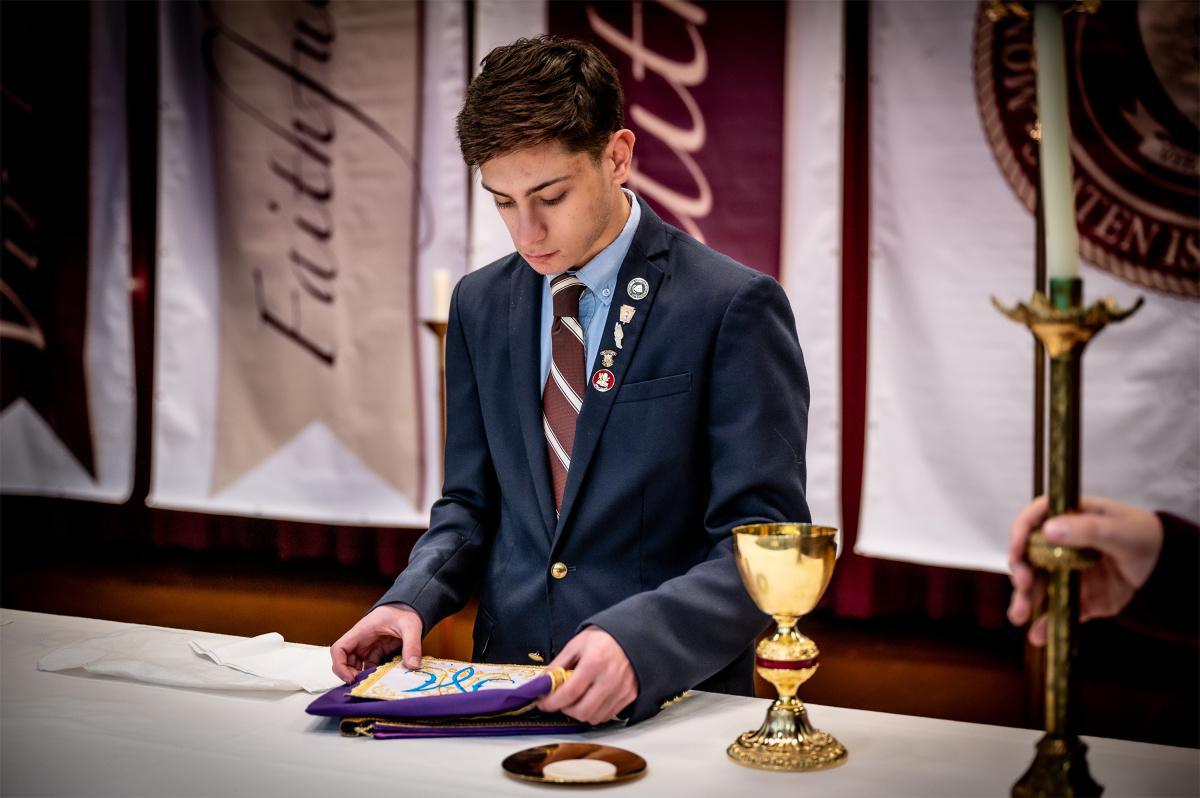.
The Department of Religion provides a sequential four-year program of required and elective courses in sacraments, scripture, doctrine, morality, history of religions and service. Each school day begins with prayer and liturgical services are provided throughout the school year.
Service
As Christians who are called upon to minister to one another, opportunities for students to engage in personal service to others and their communities are encouraged and provided through a variety of clubs.
Personal Growth
The Chapel is available for students’ personal prayer and quiet reflection.
Sacraments
Working in conjunction with the members of the Department of Religion our campus chaplain coordinates activities directly related to a student’s spiritual life and the Catholic identity of Monsignor Farrell. The celebration of the Holy Eucharist is available every morning. The reception of the Sacrament of Reconciliation takes place on Tuesdays and Thursdays. Prayer service experiences are essential parts of our students’ spiritual growth throughout the Liturgical year, especially during Advent and Lent.
Social Action
Throughout the year, school organizations sponsor drives in response to the needs of others, e.g.: Local food pantries, Thanksgiving food donations, Christmas toy collections, fundraising for national and international victims of serious illness and natural catastrophes.
Department of Theology & Religious Studies Course Sequence
Freshman Year
I. The Revelation of Jesus Christ in Scripture - The purpose of this course is to give students a general knowledge and appreciation of the Sacred Scriptures. Through their study of the Bible, they will come to encounter the living Word of God, Jesus Christ
II. Who Is Jesus Christ? The purpose of this course is to introduce students to the mystery of Jesus Christ, the living Word of God, the Second Person of the Blessed Trinity. In this course, students will understand that Jesus Christ is the ultimate Revelation to us from God. In learning about who he is, the students will also learn who he calls them to be.
Sophomore Year
I. The Mission of Jesus Christ (The Paschal Mystery) - The purpose of this course is to help students understand all that God has done for us through his Son, Jesus Christ. Through this course of study, students will learn that for all eternity, God has planned for us to share eternal happiness with him, which is accomplished through the redemption Christ won for us. Students will learn that they share in this redemption only in and through Jesus Christ. They will also be introduced to what it means to be a disciple of Christ and what life as a disciple entail.
II. Jesus Christ’s Mission Continues in the Church - The purpose of this course is to help the students understand that in and through the Church they encounter the living Jesus Christ. They will be introduced to the fact that the Church was founded by Christ through the Apostles and is sustained by him through the Holy Spirit. The students will come to know that the Church is the living Body of Christ today. This Body has both divine and human elements. In this course, students will learn not so much about events in the life of the Church, but about the sacred nature of the Church.
Junior Year
I. Life in Jesus Christ (Morality) - The purpose of this course is to help students understand that it is only through Christ that they can fully live out God’s plans for their lives. Students are to learn the moral concepts and precepts that govern the lives of Christ’s disciples.
II. Sacraments as Privileged Encounters with Jesus Christ - The purpose of this course is to help students understand that they can encounter Christ today in a full and real way in and through the sacraments, and especially through the Eucharist. Students will examine each of the sacraments in detail to learn how they may encounter Christ throughout life.
III. TCM I - TCM I is a special Religion program whereby the students are chosen at the end of sophomore year to train as Catechists in the spring semester of junior year. In the spring semester the students are prepared in the following areas:
- Use of teacher’s manuals
- Preparation of lesson plans
- Principles of education
- Catechetical guidelines of the Archdiocese of NY
- Motivation
- Questioning skills
- Discipline Strategies
- Classroom management
- Teaching techniques; use of the board, visuals, etc.
At the end of junior year teams, are placed in a CCD program at one of the local Catholic elementary schools.
Senior Year
I. TCM II - Grade 12 (Elective) - TCM II is a continuation of junior year. The students go to various parishes to teach in the Faith Formation programs (CCD). The teams are observed once during the year by their TCM instructor and twice by their DRE to ascertain their midterm and final grades. Lesson plans are submitted weekly by the TCMII seniors. Upon completion of the TCM II class, the students receive Level I Catechist Certification from the Archdiocese of NY.
II. Responding to the Call of Jesus Christ. Vocation and Christian Lifestyles - The purpose of this course is to help students to understand the vocations of life: how Christ calls us to live. In this course, students should learn how all vocations are similar and how they differ. The course should be structured around married life, single life, priestly life, and consecrated life. Students should learn what it means to live life for the benefit of others and the value in considering a vocation in service to the Christian community.
III. Ecumenical and Interreligious Issues – World Religions - The purpose of this course is to help the students understand the manner in which the Catholic Church relates to non-Catholic Christians as well as to other religions of the world. Building on the foundational truth that Jesus Christ established the Catholic Church and entrusted to her the fullness of God’s Revelation, the course is intended to help students to recognize the ways in which important spiritual truths can also be found in non-Catholic Christian churches and ecclesial communities as well as in non-Christian religions. It is also intended to help them to recognize the ways in which other systems of belief and practice differ from the Catholic faith.


